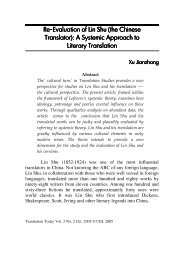Drama Translation: Principles and Strategies Drama Translation ...
Drama Translation: Principles and Strategies Drama Translation ...
Drama Translation: Principles and Strategies Drama Translation ...
Create successful ePaper yourself
Turn your PDF publications into a flip-book with our unique Google optimized e-Paper software.
58 <strong>Drama</strong> <strong>Translation</strong>: <strong>Principles</strong> <strong>and</strong> <strong>Strategies</strong>aptitudes that the drama translator should possess, particularly in thecase of the African drama translator. In effect, most Africanplaywrights still use European languages to present or describe thecultural <strong>and</strong> socio-political experiences of their different countries<strong>and</strong> villages in which their inspiration <strong>and</strong> creativity are rooted.Their writings in these European languages could be said toconstitute a form of translation from their mother tongues for whichthere is no corresponding written original but rather only an oral one.The playwrights’ texts therefore often carry a double language: theEuropean language <strong>and</strong> the playwright’s mother tongue. The Africanplaywright’s special use of language resulting from <strong>and</strong> reflectingthis ambivalent situation is often evident in their plays at variouslevels (lexical, syntactic, imagery, proverbs, dialogue, rhetorical <strong>and</strong>other stylistic devices). All this of course has an effect on thetranslation of the plays as the playwright’s indigenous thoughtpatterns <strong>and</strong> linguistic features in the source text would require thatthe translator analyses <strong>and</strong> interprets them appropriately in order totransfer them adequately to the target text.Another observation with respect to drama translationprinciples highlighted above is their prescriptive nature. This is veryevident from <strong>and</strong> illustrated by the abundant use of words <strong>and</strong>expressions (highlighted in italics by me in the various passagesquoted above) that carry an injunctive <strong>and</strong> imperative tone <strong>and</strong>which converge to give the principles a rather heavily prescriptivetone. It is probably as a result of observation by scholars that thesetranslation principles are rather theoretical in nature <strong>and</strong> are notoften readily applicable in concrete situations that they have found itnecessary to direct their investigations in another direction, that ofstrategies which are effectively used by the practising translator ingiven circumstances. The most prominent of these strategies areexamined below.As from the nineties, drama translation scholars began toexamine the phenomenon of drama translation from the viewpoint of
















